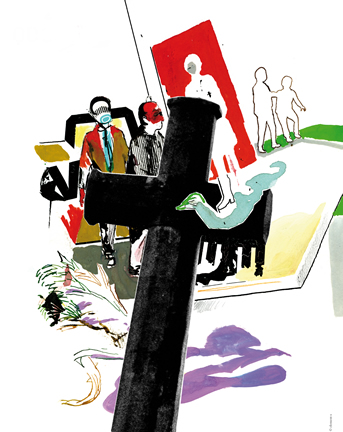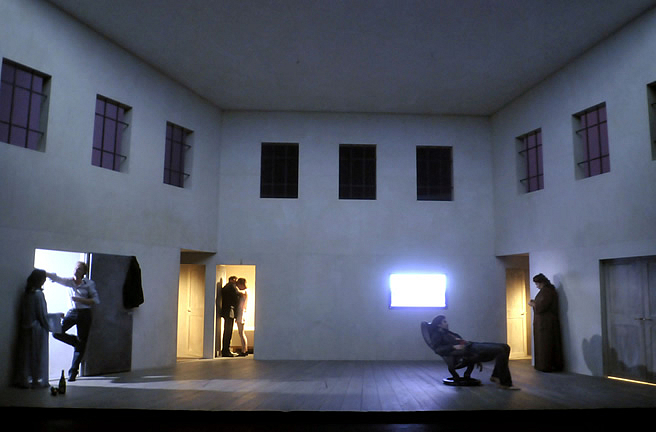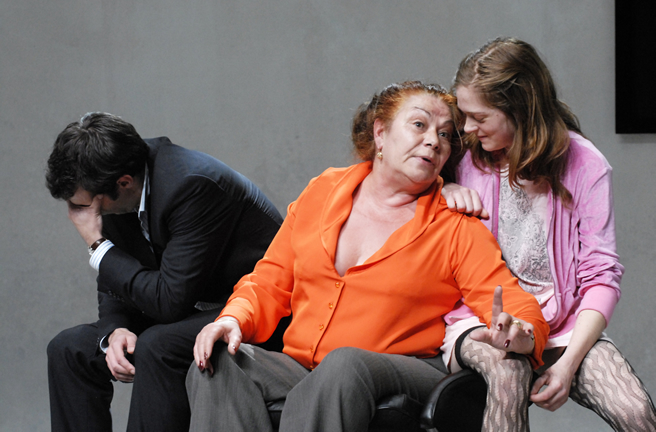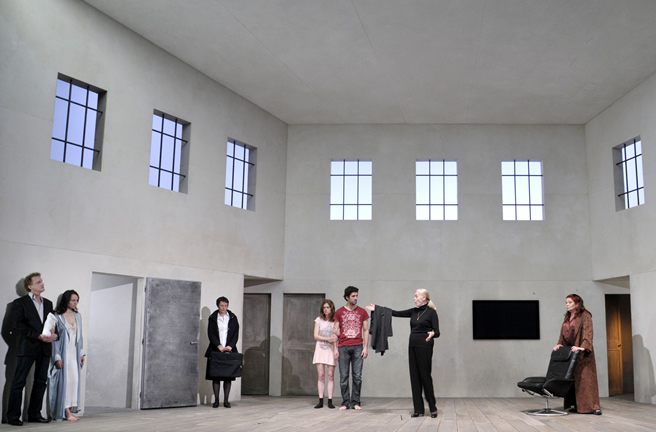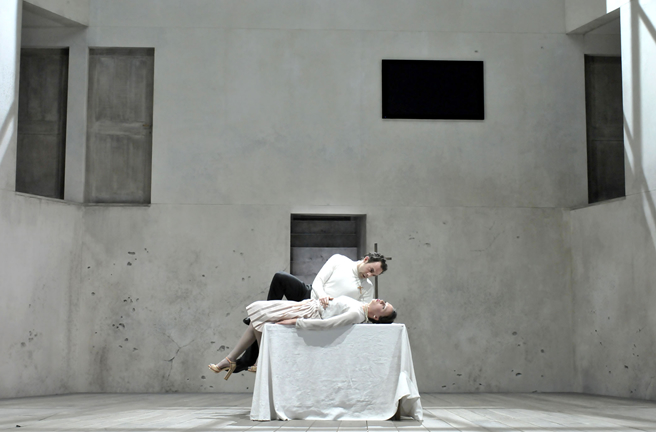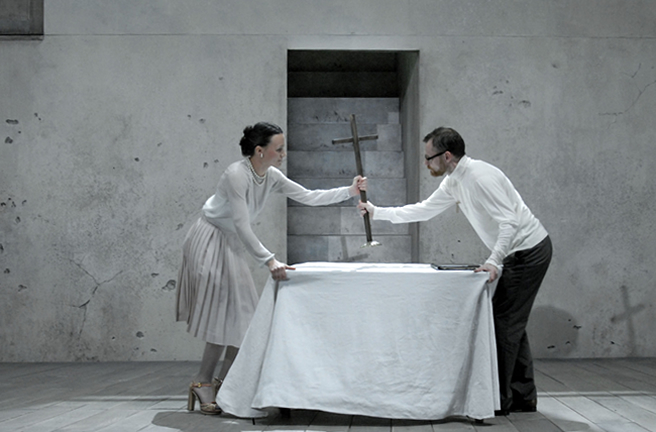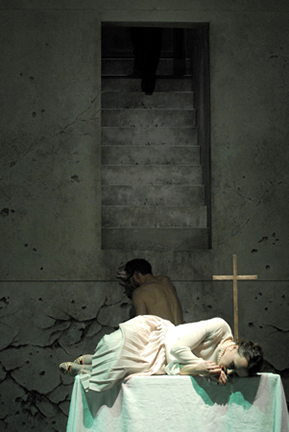It is a great offence to vices to expose them to public ridicule.
Molière
We «speak the language of Molière» just as the Germans «speak the language of Goethe» and the English that of Shakespeare. Molière is the beating heart of our great theater tradition. Molière the playwright is a national treasure. But Molière the novelist ? If he never existed, it is up to us to invent him says Stéphane Braunschweig.
The future director of the Théâtre de la Colline, likes to tackle major plays by pulling out what he calls their « underlying novel ». This method of inquiry, which is as intuitive as it is faithful to the text, allows him to give all the questions raised in the text, their sparkle and shine, just by letting himself be guided by the unexpected surprises they provoke.
In this case, his point of departure is the following: Tartuffe is undoubtedly a hypocrite, but that is not sufficient enough to explain the influence he welds over his main victim. Which means one of two things ; either he is a great impostor - but then the entire Orgon household should have succumbed to his traps, and not only the head of the household ; or his mask of piety is not a very believable one, in which case he shouldn't have fooled anyone, not even Orgon. Which leads him to the question : why does Orgon let himself get taken in by his host ? Why does the « fake » pious and devout Tartuffe fascinate his prey so much that the latter is ready to offer him the hand of his daughter and full possession of all his worldly goods ? And so it appeared to Braunschweig, that Tartuffe is first and foremost a cracked mirror that Orgon uses in order to divert all attention from his own shortcomings. Tartuffe's success should in fact be interpreted as a symptom of Orgon's own sickness. And this is where the novel-conjecture comes in : « One must imagine Orgon's life, his strict education, his relation with his bigoted mother ; his first marriage to a woman whom his mother liked, and who therefore had to be light years from an incarnation of joy ; the compensation he drew from his social and professional success and the steady growth of his material wealth ; his second marriage with Elmire, a young, joyful woman who is sensual and with whom Orgon is able to discover all the joys of the flesh and at the same time, jealousy (...). The obsession with sin, the guilt linked with sex, jealousy that drives one mad, the need for purity in a world that one feels to be completely corrupt, everything comes together to make Tartuffe the providential man, a doctor of the soul, capable of healing the « sickness » that Orgon and his family suffer from (the children being no less immune to its symptoms than their father or their grandmother...)
In this way, Braunschweig continues, beyond the comical dimensions of Tartuffe, to lead an inquiry that he began in his stage productions of Brand, Measure for Measure or Peer Gynt : the theme of spiritual temptation as the hidden facet of all of our materialist obsessions.
Cast
by MOLIERE
direction and scenography by STÉPHANE BRAUNSCHWEIG
costumes : Thibault Vancraenenbroeck
lights : Marion Hewlett
sound : Xavier Jacquot
artistical collaboration : Anne-Françoise Benhamou
collaboration to the scenography : Alexandre de Darden
with Jean-Pierre Bagot, Christophe Brault, Clément Bresson, Thomas Condemine, Claude Duparfait, Julie Lesgages, Pauline Lorillard, François Loriquet, Annie Mercier, Sébastien Pouderoux, Claire Wauthion
production Théâtre national de Strasbourg
created in April 29th, 2008 in the Théâtre national de Strasbourg
length : 2 hours 10 minutes
,
Director
Stéphane Braunschweig was born in Paris in 1964. After studying philosophy at the École Normale Supérieure, he joined Antoine Vitez's École du Théâtre national de Chaillot in 1987, where he received two years of theatrical training. In 1988, he founded his own company, Le Théâtre-Machine, with which he created his first shows. In 1991, at the Centre dramatique national de Gennevilliers, he brought them together in a trilogy entitled Les Hommes de neige, for which he received the Prix de la révélation théâtrale from the Syndicat de la critique. From then on, he was a regular guest at the Festival d'Automne in Paris, and began presenting his work in major European capitals (Berlin, London, Moscow). In 1992, at the invitation of Stéphane Lissner, he staged his first opera at the Châtelet.
Stéphane Braunschweig was director of the Centre dramatique national/Orléans-Loiret-Centre from 1993 to 1998. There, he created a dozen shows that toured throughout France and were received at major festivals (Automne à Paris, Avignon, Edinburgh, Istanbul, Rome), and for his unabridged version of Ibsen's Peer Gynt he received the Prix Lerminier from the Syndicat de la critique. During this period, he developed an international career in both opera (notably in Berlin with his Fidelio conducted by Daniel Barenboim, but also in Brussels and Venice) and theater. Fluent in English, German and Italian, he was invited to England for Shakespeare's Measure for measure, to Milan's Piccolo Teatro for Skakespeare's Mercanto di Venezia, and to Munich for Büchner's Woyzeck, for which he was awarded the Bayerischen Theaterpreis (best theater performance of the year in Bavaria).
Stéphane Braunschweig was director of the Théâtre national de Strasbourg and its School from 2000 to 2008. He developed a three-pronged project: to make Strasbourg a true European theatrical crossroads, to set up a small permanent company as the artistic soul of the theater, and to revitalize the School by creating - for the first time in France - a training program in directing and dramaturgy. In eight years, the number of subscribers has more than doubled, Strasbourg has once again become an important place for theater in Europe, and the School can pride itself on having trained some of today's finest young directors. Among its most famous productions, Brand by Ibsen in 2005 and Tartuffe by Molière in 2008 were again awarded the Prix Lerminier by the Syndicat de la critique. During this period, he staged a number of operas at the Festival d'Aix-en-Provence, including a co-production of Wagner's Ring with the Salzburg Easter Festival and the Berlin Philharmonic Orchestra, conducted by Sir Simon Rattle. His production of Berg's Wozzeck at the Opéra de Lyon in 2003 was awarded the Prix Rostand by the Syndicat de la critique. And in December 2008, he created Verdi's Don Carlo for the prestigious opening of La Scala's season in Milan.
Stéphane Braunschweig was director of the Théâtre national de la Colline from 2010 to 2015. His aim is to change the way contemporary writing is perceived, by giving pride of place to “stage writing” and therefore to young directors, and to win the loyalty of a wide audience for shows that are as much adventures as they are discoveries. We surround ourselves with renowned associate artists such as Stanislas Nordey, as well as lesser-known ones like Célie Pauthe and Caroline Guiela Nguyen, and initiates pilot experiments in artistic education and the transmission of knowledge. For the 15-16 season, the number of subscribers to La Colline exceeded its historic threshold of 10,000 for the first time. His most notable productions include his adaptation of Pirandello's Six personnages en quête d'auteur at the Avignon Festival, and more recently his Géants de la montagne by the same Pirandello, his creations by contemporary Norwegian playwright Arne Lygre, and his Canard sauvage, invited by the Oslo Ibsen Festival, which selects the world's best Ibsen productions of the last two years. His opera credits include productions for the Opéra-Comique (Debussy's Pelléas et Mélisande) and the Théâtre des Champs-Élysées (Mozart's Idoménée and Don Giovanni, Bellini's Norma).
Stéphane Braunschweig is Director of the Odéon-Théâtre de l'Europe from 2016 to 2024. As soon as he arrived, he brought on board Caroline Guiela Nguyen, Christiane Jatahy, Sylvain Creuzevault and Simon Stone: two women and two men, two French, one Brazilian and one Australian, and among them three young people in their thirties. Stéphane Braunschweig has clearly stated his desire to anchor the Théâtre de l'Europe in a landscape that extends beyond Europe's borders, and to develop programming that strives for gender equality, while giving pride of place to the discovery of young French and foreign artists. These include the Russian Timofeï Kouliabine and the Englishman Alexander Zeldin, who will also become an associate artist from 2020. Stéphane Braunschweig is also committed to promoting greater diversity on stage, whether in his own casts (Soudain l'été dernier, Macbeth, Iphigénie...) or by continuing for two seasons the 1er ACTE artistic education project he initiated at La Colline. Among his most memorable shows is Molière's École des femmes, a play that resonates with the current political climate. resonance with the #MeToo movement, Comme tu me veux by Pirandello, a rarely-performed play about the European traumas of WW14, Nous pour un moment and Jours de joie, a continuation of his collaboration with Norwegian playwright Arne Lygre. His latest creation, a rereading of Andromache's amorous passions through the traumas of war, was enthusiastically received. During this period, he also directed for the first time at the Comédie-Française (Racine's Britannicus), the Oslo National Theatre (Ibsen's Solness the Builder), the Moscow Theatre of Nations (Chekhov's Uncle Vanya) and the Stockholm Dramaten (Lygre's Jours de joie). In opera, he gave the world premiere of Sebastian Fagerlund's Sonate d'automne at the Helsinki Opera and returned to the Théâtre des Champs-Elysées for Tchaikovsky's Eugene Onegin. He also staged Mozart's Requiem at the Opéra de Bordeaux.
After almost 30 years as a theater director, Stéphane Braunschweig has decided to devote himself fully to his artistic work. With his new company Pour un moment, he is preparing Chekhov's The Seagull and Arne Lygre's À notre place. In 2025, he will stage Mozart's The Magic Flute in Stockholm, Cimarosa's The Secret Wedding at the San Carlo Opera in Naples, and Tchaikovsky's Iolanta at the Bordeaux Opera.
Stéphane Braunschweig is also a scenographer: he has designed almost all the sets for his shows.
As a teacher, Stéphane Braunschweig has taught acting, stage design and directing at numerous schools, starting with the Théâtre national de Strasbourg, the Conservatoire national de Paris and the Ecole régionale de Cannes.
In addition to his almost eighty theater and opera productions, Stéphane Braunschweig is an author and translator. He has published a collection of texts and interviews on theater entitled Petites portes, grands paysages, published by Actes Sud, and has translated plays by Büchner, Kleist, Brecht, Pirandello and Lygre from German, Italian and Norwegian.
Stéphane Braunschweig is Chevalier de la Légion d'honneur, Chevalier de l'Ordre national du Mérite, Officier des Arts et des Lettres and Commander of the Royal Norwegian Order of Merit. He has also been awarded the Copola and Prati Prize (1991) and the European Theatre Prize of the European Cultural Foundation (2005).
Franziska by Frank Wedekind, in January 1996
Tartuffe by Molière, in September-October 2008
Soudain l'été dernier, by Tennessee Williams, in March-April 2017
Macbeth, by William Shakespeare, in January-March 2018
L'École des femmes, by Molière, in November-December 2018
Nous pour un moment, by Arne Lygre, in November-December 2019
Uncle Vanya [Дядя Ваня /Oncle Vania], by Anton Chekhov, in January 2020
Iphigénie, by Jean Racine, in September-October 2020
Comme tu me veux, by Luigi Pirandello, cancelled in January 2021 and rescheduled in September-October 2021
Jours de joie, by Arne Lygre, in September 2022, in April-May 2024
Andromaque, by Jean Racine, in November-December 2023


